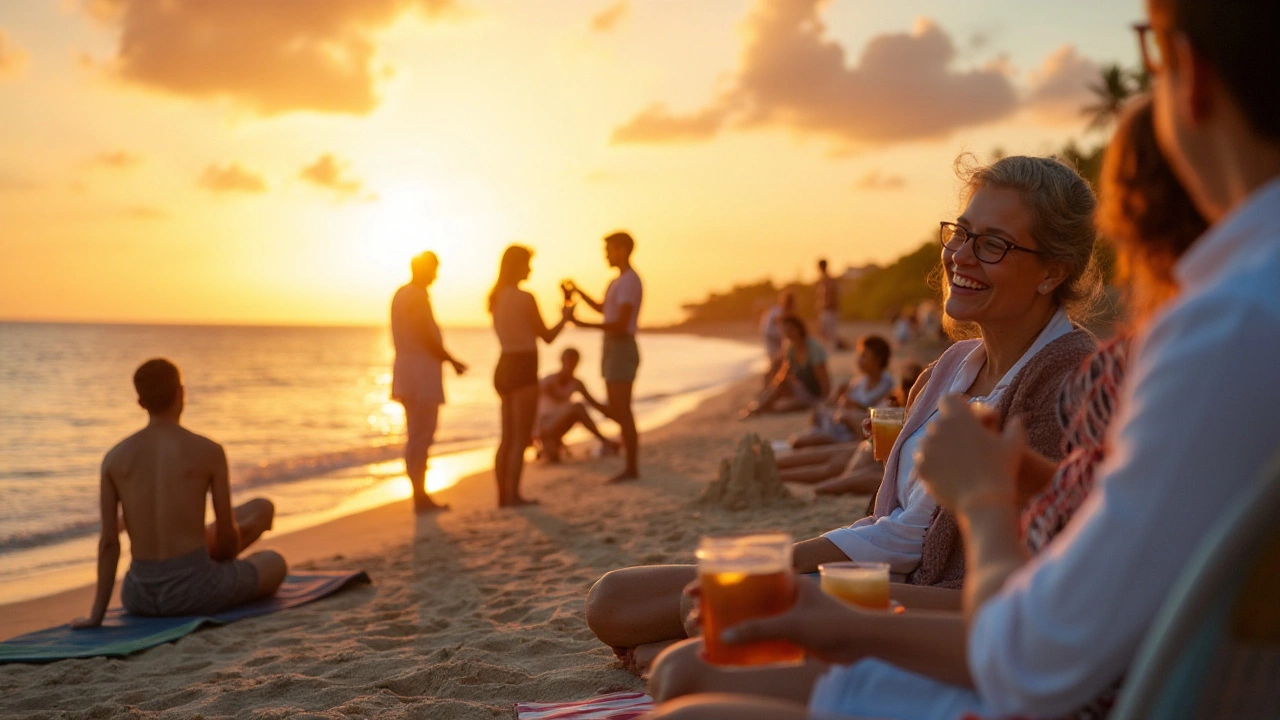Imagine planning a vacation where all your meals, drinks, and even some activities are seamlessly included in the price. This is the allure of all-inclusive hotels, an enticing package for travelers looking to simplify their trip. In recent years, the all-inclusive model has gained significant popularity, but is it truly more cost-effective than paying for services and amenities a la carte?
Deciphering the value of an all-inclusive deal requires a closer look at what such packages offer versus the actual expenses incurred during a conventional hotel stay. For many, it's not just about saving money; it's about the convenience of knowing the precise cost of a vacation in advance. However, travelers should be mindful of the potential extras that might not be included, ensuring they're not blindsided by unexpected costs.
Through this exploration, we'll shed light on the ins and outs of all-inclusive stays, offering insights and tips to help you decide if this option suits your travel style and budget. Dive into the strategy behind choosing a hotel that caters to your needs and enhances your experience, without stretching your wallet too thin.
- Understanding All-Inclusive Pricing
- The Hidden Perks and Costs
- Comparing Traditional and All-Inclusive Stays
- Making the Most of Your All-Inclusive Experience
- Tips for Choosing the Right All-Inclusive Hotel
Understanding All-Inclusive Pricing
When delving into the alluring world of all-inclusive resorts, it's essential to grasp the nuances of what these packages entail. The term 'all-inclusive' suggests that everything needed for a fulfilling vacation is covered in one upfront cost. This usually encompasses accommodations, meals, drinks, and often entertainment and activities. But what lies beneath this enticing premise can be a bit more complex than it initially seems. Travelers attracted to the concept should invest time in dissecting which amenities are truly included and which might incur additional charges.
Those unfamiliar with the all-inclusive model might be surprised to discover that not all inclusions are created equal. For starters, the range and quality of included meals can vary remarkably from resort to resort. Some may offer a variety of à la carte dining options and gourmet experiences, while others stick to buffet-style meals. This difference may not be apparent until arrival, so it's helpful to research this aspect ahead of booking. Similarly, drinks might be part of the deal, yet they can range from basic to premium, influencing the perceived value of the package.
An often-overlooked aspect is the range of activities included in an all-inclusive stay. While some resorts boast a plethora of activities—think snorkeling, guided excursions, or fitness classes—others may offer limited or repetitive options. Potential hidden costs can rear their head if a traveler is inclined towards more niche activities or premium services like spa treatments that are typically not part of the base package. Understanding the specifics of these offerings can play a crucial role in determining whether an all-inclusive stay will live up to the guest's expectations.
Interestingly, one of the more compelling benefits of this kind of hotel experience is the ability to lock in costs early on, thereby avoiding inflated prices during peak travel seasons. In regions where tourist activity heavily influences prices at local restaurants and attractions, this can represent significant savings. However, it's wise to remain cautious of potential pitfalls, such as limited booking for supposedly included experiences. "The clarity of what's included in all-inclusive deals is essential," notes travel expert Mark Hodges.
"Guests should not shy away from asking direct questions regarding what they should expect for the cost."
For those new to the all-inclusive scene, it can also be advantageous to compare offers through an online search before committing, examining the fine print detailing inclusions. Seasoned travelers understand that a higher upfront cost might translate into better offerings, as this typically reflects the quality of service, facilities, and supplies provided. In choosing a resort, it becomes critical to identify individual priorities whether it's luxurious accommodation or vivid cultural experiences that make the trip unforgettable.
The Hidden Perks and Costs
Exploring the delightful intricacies of an all-inclusive resort reveals a world brimming with tempting perks and a few surprises. At first glance, the concept encompasses everything—from gourmet meals to spirited drinks and vibrant activities—all wrapped up in a neat package. However, like a hidden lagoon, the true depth of these offers is only revealed upon closer scrutiny. Many travelers find joy in knowing they can order anything from the menu without eyeing the bill, transforming a simple meal into a lavish feast worthy of their desires.
Yet alongside this enticing ease comes the necessity to remain alert to the boundaries of all-inclusiveness. For instance, while many resorts generously include unlimited buffets and sit-down dining, premium specialty restaurants on the premises might require an additional fee or even advanced reservations. This is especially common in upscale all-inclusives, where culinary gems lie behind velvet ropes. It's essential for travelers to research their chosen resort's dining policies beforehand to avoid unwanted surprises when tempted by something beyond the norm.
A common misstep is to assume all activities and amenities are part of the package deal. While it's true that resorts are often equipped with thrilling opportunities for land and sea adventures, certain premium activities like scuba diving, deep-sea fishing, and zip-lining may come at a premium cost. As one excited vacationer put it, "The joy of finding both relaxation and adventure in a singular place surely outweighs having to compare endless prices," yet they were quick to add that a careful glance at the activity list helped sidestep any unexpected charges.
Across the globe, vacation budgeting is a topic of interest for many families and solo travelers alike. Experts often agree that while the upfront cost may be higher than booking a standard hotel, the peace of mind that comes with one-time payment often counterbalances any worries about exceeding one's vacation budget. The initial sticker shock is softened by the fact that regular inflations in pay-per-use meals and recreational activities at traditional accommodations can quickly drive the costs well beyond what was initially planned.
Some referenced studies provide further context to this, showing that on an average week-long vacation, tourists may actually surpass their intended budget by 20-30% when opting for pay-as-you-go models. Say goodbye to surprise charges that sneak up during your blissful escape—none of which exist when every cocktail and kayak rental is pre-paid. However, vigilance is still required; for those who enjoy venturing beyond the resort's boundaries for cultural tours or local dining experiences, the costs can tally swiftly.
To add a note of practicality, those planning for the cost-effective hotel stay should compare offerings not only among all-inclusives but also between regions and seasons. An eye-catching package in the Bahamas will differ from a stunning deal in Southeast Asia, not just in price, but in the array of inclusive extras tailored to each locale. Consider each resort's advertised perks carefully and weigh them against your traveler's instinct for exploration versus comfort. Ultimately, the key is to align your vacation vision with what your hotel's all-inclusiveness can truly, and affordably, deliver.

Comparing Traditional and All-Inclusive Stays
When weighing the benefits of traditional hotels against all-inclusive resorts, it's important to consider various factors that go beyond surface-level costs. For many vacationers, the decisive feature of all-inclusive destinations is the ease of budgeting. Knowing all your expenses are covered by a single price can bring peace of mind, especially for families trying to keep an eye on spending. With traditional accommodations, however, the unpredictable nature of meal, drink, and activity costs can sometimes lead to surprise expenditures, which can quickly add up to more than anticipated.
All-inclusive resorts often capitalize on volume and efficiency. Many are large properties with numerous dining options, entertainment, and sports facilities, which are effectively subsidized by the collective purchase of all guests. Therefore, guests who enjoy trying different restaurants, or partake in multiple activities, might find these packages more cost-effective. In contrast, traditional hotels often present opportunities to explore local culture and dining, fostering a different kind of vacation experience. With an a la carte setup, travelers have the chance to customize every aspect of their stay, cherry-picking experiences that suit their tastes and budgets, often allowing for a truly unique travel experience.
Beyond pricing structures, another consideration is how these accommodations impact the local communities. According to the Caribbean Tourism Organization, the growth of all-inclusives has been a boon for travel numbers, although their economic impact on local businesses is mixed. Many traditional hotels encourage interaction with local vendors, infusing cash into the surrounding economies. An all-inclusive model might inadvertently contain spending within the resort's own ecosystem, somewhat insulating visitors from outsiders. For the conscientious traveler, this could mean weighing the benefits to personal budgets against the potential economic effects on local businesses.
If you're someone who values a seamless vacation with little planning beyond initial booking, an all-inclusive resort could be the perfect answer. For those who enjoy spontaneity, or seek a deeper connection with their destination, a traditional hotel might be the better choice. Whether it's savoring a hidden gem of a restaurant or discovering a cultural festival untouched by resort life, the unplanned can often become the most memorable aspect of a trip. This comparison, then, isn't just about cost—it's about crafting the type of experience that matches what you wish to gain from your travels, be it comfort and predictability, or adventure and exploration.
As travel professionals like Sarah Allard from Condé Nast Traveler put it,
"The key is to match your vacation goals with the right type of accommodation, whether that means predictably luxurious or delightfully unpredictable."The choice between all-inclusive resorts and traditional hotels should reflect what excites you about travel, ensuring that each journey is as rewarding as the last. Understanding these nuances empowers you to select spaces that work not just within your budget, but also enhance your travel story.
Making the Most of Your All-Inclusive Experience
Diving into the world of all-inclusive resorts is like stepping into a realm where the mundane worries of budgeting for meals and entertainment evaporate. One of the key aspects of maximizing this experience lies in understanding the full spectrum of what your package includes. Many travelers fail to harness the full potential of their all-inclusive deals because they simply don’t know what's available to them. Hence, before arrival, take a close look at everything offered by the resort. From unlimited snorkeling to culinary classes, these extras can significantly enhance your stay without adding strain to your wallet.
Another essential step is to make reservations for popular restaurants or special activities as early as possible. Many guests quickly secure their spots at these in-demand venues, leaving the procrastinators with limited options. Also, be sure to engage with the resort’s concierge or guest service team upon arrival. They hold a wealth of information about tours, excursions, and activities that might pique your interest, and they often can offer insightful personal recommendations.
When it comes to beverages, consider exploring beyond the default options. Although resorts typically offer a standard cocktail menu, sometimes they encourage guests to try a selection of premium spirits or unique local brews at no additional cost. By engaging with the bartenders, you might uncover delightful, unexpected choices that add value to the experience. Additionally, take full advantage of the entertainment options. Usually, all-inclusive resorts curate a plethora of live shows, theme nights, and cultural performances. Participating in these events introduces a rich tapestry of experiences that deepen your appreciation of the local culture and maximize the entertainment value of your stay.
Moreover, for those inclined toward a fitness regime, most resorts feature well-equipped gyms, yoga classes, and watersports activities that could provide the perfect balance to the indulgent dining options. It's an excellent way to keep active and healthy while enjoying the vacation vibe. For families, many resorts offer fantastic kids’ activity programs that can enrich your little one's experience while giving adults some precious alone time. Additionally, remember to occasionally step outside the resort’s confines. Though the temptation might be to soak up every minute in paradise, exploring local attractions, markets, or nearby villages offers a change of pace and a refreshing local perspective.
According to travel expert Samantha Brown,
“The magic of an all-inclusive isn’t just in what’s covered; it’s in all the unexpected experiences that don’t cost anything but mean everything.”It’s wise to venture out and seek these intangible moments, which can sometimes prove to be the highlight of the trip. Lastly, consider the timing of your travel. Some of these all-inclusive resorts offer better deals during the off-peak seasons, guaranteeing a less crowded experience with more personalized attention. This can significantly enhance the value of your package.
To sum it up, ensuring you enjoy every facet of your all-inclusive holiday means being proactive, curious, and open to the array of possibilities these resorts present. With a bit of planning and the willingness to explore both on-site and off-site, you can transform your stay into a remarkably memorable journey that goes beyond just comfortable accommodations and indulge in a plethora of enriching experiences. Your vacation deserves to be more than a fleeting escape; it should be a tapestry of cherished memories etched into your travel book, one unforgettable experience at a time.

Tips for Choosing the Right All-Inclusive Hotel
Choosing the right all-inclusive hotel requires careful consideration and research, as the options can vary widely. With the right preparation, you can find an option that provides the best value for your vacation style and budget. First, think about the destination that interests you. Locations like the Caribbean and Mexico boast a plethora of all-inclusive resorts. It's crucial to consider the climate and timing of your visit, as prices might fluctuate based on the tourist season and weather conditions. Check for any seasonal deals or discounts that resorts might offer during off-peak months.
Next, evaluate what is included in the package. Basic inclusions often cover meals, drinks, and certain activities, but it's essential to dive deeper. Some establishments offer gourmet dining options, excursions, and even spa treatments as part of their offerings, which can be a huge boon for your vacation experience. However, amenities can vary significantly between resorts, so make certain to verify exactly what you're getting. Look for any hidden fees, such as those for premium beverages or specialty dining, which could increase costs unexpectedly.
Reviews and Ratings
Online reviews and ratings are invaluable resources when assessing all-inclusive hotels. Guest feedback can unveil truths not shown in glossy promotional images, offering realistic insights into the true quality of service and accommodations. TripsAdvisor, Booking.com, and Airbnb often have comprehensive reviews from previous guests. However, do not just focus on the scores. Pay attention to recent comments, as management and service can change over time. Consider the demographics of those posting reviews and whether they align with your vacation preferences. Are they families, couples, or solo travelers? Their perspectives can offer a glimpse of what your own experience might be like.Comparing Costs and Benefits
It is also important to do a cost-benefit analysis. Compare the price of an all-inclusive package with what you'd expect to spend on a non-inclusive stay. Factor in meals, drinks, entertainment, and any extra amenities you envision utilizing. Jot down the anticipated daily expenses and see if the all-inclusive rate offers a better deal. Some travelers find the upfront cost of an all-inclusive daunting, but it often turns out to be the most economical option when considering improvements in unaffected ways.When selecting a hotel, location remains vital. Do you want a quiet beach resort or proximity to popular attractions and nightlife? This decision can influence your activities and interest level throughout the trip. If you're planning to venture into local areas, transportation services included within the resort might save you hefty taxi fares and provide convenience. Finally, always cross-check resort ratings across different websites and media outlets.
"All-inclusives make vacation planning much simpler," shared the renowned travel expert Rick Steves. "Once you arrive, everything is taken care of, and you can focus on having fun rather than fretting over logistics.”
In short, research, planning, and reviewing can make your selection of an all-inclusive resort feel less like a gamble and more like a tailored experience. Keeping these points in mind ensures that your time is well-spent and your money is justly rewarded.Travel tips such as these empower travelers to make informed vacation decisions and find the perfect getaway.
